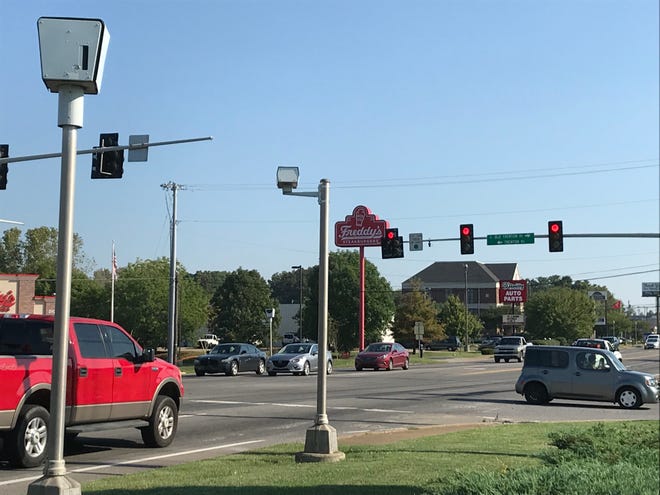Are Speed Cameras Legal In Tennessee

After Texas banned red-light cameras terminal month, joining at least seven other states, Tennessee could be side by side.
A country lawmaker who has long crusaded against traffic enforcement cameras is planning to introduce an outright ban during the 2020 legislative session.
Crimson-lite and speeding cameras accept generated controversy in Tennessee and nationwide for more than a decade, but the opposition is now gaining footing. More than U.S. cities have discontinued red-light cameras than added them since 2012, according to the Insurance Institute for Highway Safety.
But a proposal to ban them statewide would meet opposition from local governments and police that rely on the revenue.
Supporters say cameras reduce the number of "T-bone" crashes and are a bonus for government coffers. Opponents say the cameras are more than about generating coin for private photographic camera contractors and local governments than well-nigh rubber, and that they increment rear-finish collisions. Both sides cite studies to back up their claims.
"We accept privatized law power in this process," said Rep. Andy Holt, R-Dresden. "It's all based on generating acquirement."
Support local journalism past condign a subscriber today.
Tennessee would accept to overcome local fiscal challenges
Holt has been eyeing the Texas legislative ban, which takes effect in September. He tasked Paul Overholser, the researcher for the Firm Finance, Ways & Means Committee, to written report the issue.
One obstacle to the General Associates passing a ban, Overholser said, is that the state would accept to cover the local governments' losses for at to the lowest degree a year, co-ordinate to state constabulary. But this coming year's upkeep is forecast to take a salubrious surplus, he said, and so this may be the year to try.
Last legislative session Holt was handed a defeat after he introduced legislation that would accept forced cities to pay non-refundable courtroom fees for each camera violation issued. Amid opposition from the Memphis Police Department and Memphis legislators, the bill died in committee.
Approximately 16 Tennessee cities apply cherry-red calorie-free cameras, and thirteen use speed cameras, according to the Insurance Institute for Highway Prophylactic, which conducts an informal survey.
The revenue can be meaningful for cities big and small-scale. Memphis made $iii.eight million from red light cameras in fiscal 2018 lone, according to the city upkeep. Memphis officials say they significantly reduced the most dangerous types of collisions at intersections with cameras. Nashville doesn't take any enforcement cameras.
Marriage City, a West Tennessee town with a population of 10,500, received an boilerplate of $253,000 a twelvemonth in contempo years from its red low-cal and speed cameras. That money is used for road maintenance, said Police Chief Perry Barfield.
"A monetary fine is the only way to get people's behavior to change," Barfield said. "Information technology'south as much a deterrent every bit it is enforcement."
That amount is less than half of the full paid fines in Union City, though, equally 55% went to Redflex, the city's vendor, co-ordinate to metropolis records. Each city with traffic cameras negotiates its own terms.
State law limits traffic photographic camera fines to $50 each.
Camera companies extended contracts later on last legislative ban
A representative from Redflex did non respond to a request for comment. Its principal competitor, Verra Mobility, defended traffic enforcement cameras in an emailed statement.
"Each yr more than than 1,000 people in Tennessee lose their lives in traffic related fatalities," Verra Mobility spokesperson Celeste Peterson said. "We should be focusing on laws to raise road prophylactic not impede them."
Holt, who urges people to ignore their camera violation fines, gained headlines in 2016 past burning a paper citation on video and posting information technology to Facebook.
That year Holt successfully sponsored a bill that requires traffic camera companies to include a argument on citations that reads, "non-payment of this notice cannot adversely affect your credit score or written report, driver'due south license, and/or automobile insurance rates."

In 2015 he introduced a pecker that banned new contracts for speeding cameras, except those on Southward-curves and in school zones. Before the law took result, even so, some cities renewed their agreements with photographic camera companies, allowing their speed cameras to remain in place for decades.
Do you have to pay your traffic camera tickets?
With a country lawmaker insisting people don't have to pay traffic camera fines, many residents wonder if that's right especially when their ticket comes in the mail with a notice that they must pay.
The first thing to know is that it is a civil penalty, not a criminal crime. Land law classifies traffic camera citations every bit not-moving violations. That means they they cannot count against driver's licence points. Also, the police force prohibits camera companies and cities from notifying credit agencies nearly unpaid fines.
But companies can asses fees and courtroom costs against people who don't pay their tickets. What happens when those fines continue to go unpaid is up to the cities and companies.
Each Tennessee city negotiates the terms of fines collection with its camera vendor. Depending on the organisation, a urban center or company could ship the unpaid fines to a debt collection agency, or could fifty-fifty take a violator to civil court. In do, though, both of these practices are rare. The costs associated with court, peculiarly, would outweigh the $50 fine.
Accomplish Mike Reicher at mreicher@tennessean.com or 615-259-8228 and on Twitter @mreicher.
Source: https://www.tennessean.com/story/news/2019/07/08/could-tennessee-finally-hit-brakes-red-light-cameras/1639139001/
Posted by: hodgesnount1981.blogspot.com

0 Response to "Are Speed Cameras Legal In Tennessee"
Post a Comment